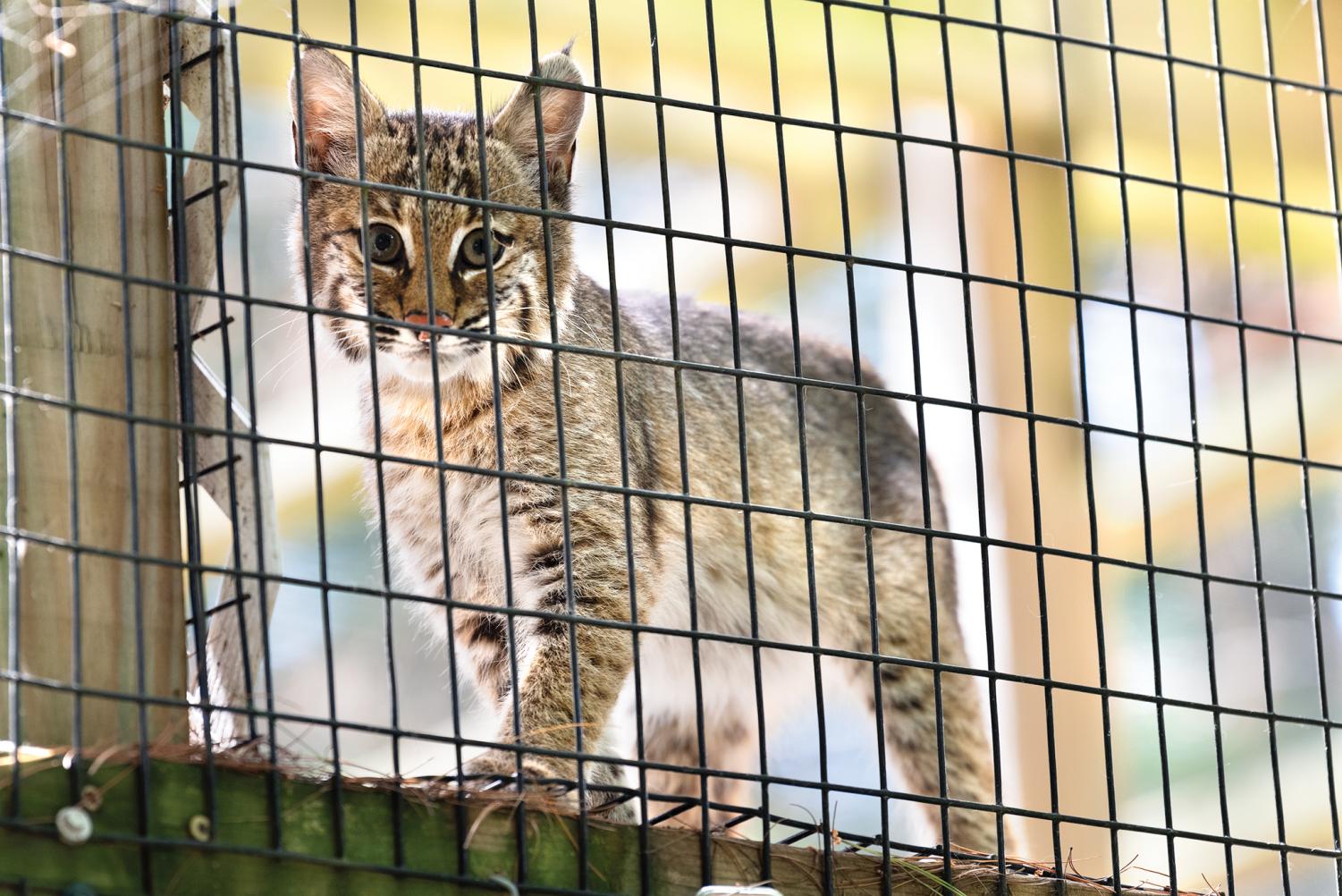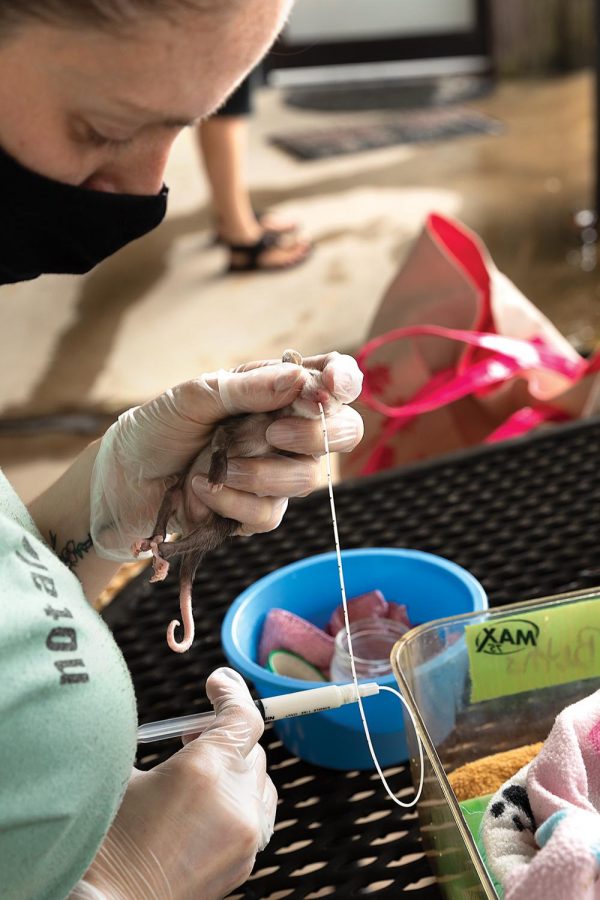Animal rehabilitation in the midst of a pandemic
“We will do whatever we can to survive and we will survive"
September 12, 2020
Like nonprofits around the world, wildlife rehabilitation clinics have had to make major adjustments because of COVID-19.
Some of these adjustments include reducing the number of volunteers in the facilities, having to operate with less funding, and caring for many more animals in need than in years past.
TreeHouse Wildlife Center, located in Dow, IL, has seen cases where an animal will all be brought in after being kept illegally by unknowing people. These people will usually take young animals from their mothers and either keep them or sell them as pets.
Advertisement
The TreeHouse Wildlife Center is licensed to care for Illinois native species, which does not include apex predators such as wolves and bears.
Kelly Vandersand, TreeHouse Wildlife Center’s fundraising coordinator, said in previous years, they had never had more than 900 animals as patients and in June they had 1,100 animals. The numbers have continued to grow over the summer and they now sit at 1,200 animals already.
“That’s another impact of COVID. There’s a lot more people out in the woods. They’ve got few things to do and one of them is to be outside doing outdoor activities so people aren’t as distracted with life and they are outdoors, seeing more animals and bringing them in,” Vandersand said.
With some of the people who would normally help in finding financial supporters focusing more on human suffering due to COVID-19, TreeHouse has had to find other means of funding.
Usually, the TreeHouse Wildlife Center hosts an annual baby shower where people will donate items requested by the clinic, but couldn’t this year with the new rules and regulations. Instead, they had a drive through baby shower where they were still able to fundraise while social distancing.
“We actually raised more this year,” Vandersand said. She said that this could be because people were bored and looking for ways to get out of the house.
In October, they also usually have Owl Fest, which is one of their largest fundraisers with bringing in an average of $8,000 over the past few years. It is a two day long event that attracts crowds of up to 2,000 people.
Advertisement*
Losing that amount of fundraising would be very hard on the clinic, so they came up with Owl-O-Ween.
To make up for lost revenue with Owl Fest, TreeHouse Wildlife is partnering with the Health Dept. to host a drive through trick-or-treat.
According to Vandersand, the TreeHouse Wildlife Center had made a deal with Beverly Farms, an organization that provides housing for people with disabilities, to train their residents to become permanent resident care specialists that would help with caring for the animals.
With the new rules and regulations for public safety, the clinic will not be able to have the extra help from Beverly Farms for the foreseeable future.
Prior to COVID-19, the TreeHouse Wildlife Center was also working to build a new multi use waterfowl and migratory bird clinic which would include an outdoor classroom, an education classroom, and a community building that would house about 50 people for more on site programming.
With this, Vandersand said that they were looking into investors right when COVID-19 hit and were not able to go through with it for the time being due to the fact that it would be between $500,000 and $1 million to complete the project.
Even though the pandemic has put many events and construction projects on hold, many people have been supporting local wildlife rehabilitation clinics throughout the pandemic.
“During COVID-19, we said hey while you’re home, look through the bottom layer of meat in your freezer and donate it- we had so many meat donations that we had to get two more freezers,” Vandersand said.
She said the donations were great at the beginning of COVID-19 when funding was lost.
Although they have applied for federal grants and were able to receive some federal funding, it is still expensive to run rehabilitation and release facilities, which is why they must continue to look for support from donors, Vandersand said.
COVID-19 has also caused many changes at the Wildlife Rehabilitation Clinic (WRC) in High Rapids, MO. Similar to TreeHouse Wildlife Center, the WRC depends on volunteers and donors to keep the daily operations afloat.
Because of this, the reduction of the number of volunteers that are allowed to be in the building at a time as well as how many volunteers are allowed to foster the animals in the safety of their homes has been a huge change for the WRC.
Special precautions have been taken to ensure the safety of the animals and volunteers. This includes requiring volunteers to wear masks, use hand sanitizer, and take their temperature prior to entering the clinic. Before leaving, volunteers wipe down all heavily touched surfaces with bleach water.
It seems that even though the stay-at-home orders have decreased the amount of roadkill in the past few months, the WRC has been facing an increase in numbers, particularly in skunks.
According to WRC volunteer, Dee Martin, she said, “I think we have a total of 40 skunks this year,” Dee Martin stated. “We don’t usually take that many, but some rehabbers are not taking many this year so our homes are just overloaded.”
Even when the stay at home orders were first introduced back in March, the clinic had very supportive volunteers who opened their homes to orphaned WRC residents.
A lot of animals come into clinics due to unfortunate human-related events. One of the most influential of these events is when animals are hit by cars. Besides whitetail deer, opossums are one species that you are most likely to see on the side of the road.
“Opossums are usually cases where mom has been hit on the road,” Martin said.
If an opossum is hit by a car, many people don’t know to check the dead marsupial’s pouch to see if there are any joeys.
For the lucky ones, they are found by someone checking to see if the mother survived the impact of the accident. The volunteers will try to save the opossum mom, but are not always successful. Once the joeys are orphaned, they are then cared for by humans until they are about 2 lbs and can be released back into the wild.
As the pandemic also affects many other organizations that rely on donors and fundraising, the Wildlife Rehabilitation Clinic will not be holding any in-person fundraising events this year. Instead, they still plan on conducting their yearly holiday mailer where they will ask for end-of-year donations.
Martin said that the volunteers believe that with everything going on right now, it would be difficult to ask families to donate more money. Although fundraising might not be an option right now, there are some donors who have continued to support the clinic throughout the pandemic.
“We will do whatever we can to survive and we will survive,” Martin said.
Photo Editor Leah Sutton can be reached at [email protected]
To stay up to date with all your southern Illinois news, follow the Daily Egyptian on Facebook and Twitter.
Advertisement



